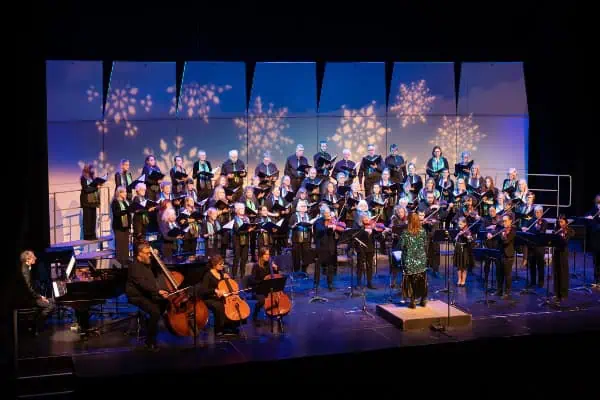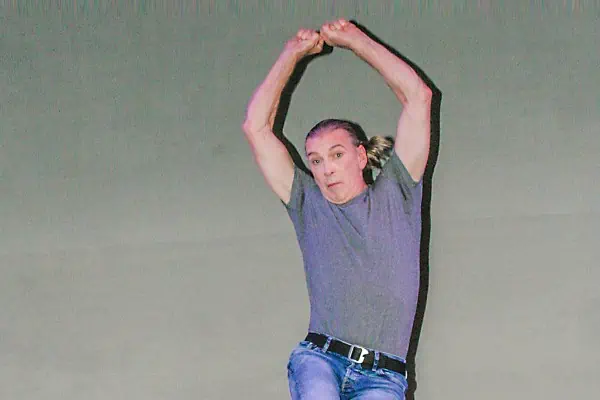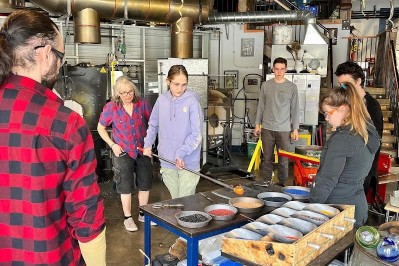When Caroline Drury-Márkos last performed at the Yukon Arts Centre, she was a jazz crooner with the popular Peter Drury Trio.
When she returns next week to kick off the Whitehorse Concerts 2011-12 season, it will be as an opera singer.
Although she studied voice with Barbara Chamberlin as a teenager, and took a few lessons with operatic soprano Sonja Anderson, she didn’t really discover her passion for classical music until several years later.
It actually happened when she was touring on Vancouver Island with the Peters Drury Trio (which she refers to simply as PDT) and chanced upon a performance by Russian baritone Dmitri Hvorostovsky in a gala broadcast from St. Petersburg.
“It was just so beautiful,” she recalls. “It kind of sparked something in me, where I remembered that I had that voice inside me, but I didn’t really know how to use it.”
It wasn’t until PDT stopped touring together a few years later that she decided to do something about it.
“At one point I started having a lot of vocal problems, and was having a lot of pain when I was singing.”
So she asked her now-husband, Christian Márkos, a cellist with the Vancouver Symphony, if he could recommend a classical singer who could help “get something back” in her voice.
He introduced her to mezzo-soprano Sarah Fryer, who had sung professionally throughout Europe and North America.
At first, Fryer just stared at her, she says.
“She looked at me and said, ‘I can’t believe you’ve been singing jazz for eight years,’ and I said, ‘Well I have,’ and she said, ‘But you’re a soprano. I just don’t get it.'”
Drury-Márkos took it as a sign.
“I loved my first few lessons with her and I was really ready to do something else. I had always wanted to go back to school, but the time was never right,” she says.
“It turned out that I went back to school for opera, because I had just rediscovered that part of myself and I really believed that I could do something with it if I worked really hard.”
After two years at Vancouver’s Kwantlen Polytech, she spent three years in the opera department of University of British Columbia getting her undergraduate degree. Last month she moved to Winnipeg to begin a two-year Masters program.
But the transition to classical performance wasn’t easy at first, even after eight years of feeling “totally comfortable” onstage as a jazz singer.
“When I went back to classical singing, I developed this incredible stage fright. The feeling was like I was dying in a burning plane crash and I couldn’t get out. It was terrifying,” she admits.
“You just feel like you’re not good enough, and you need to hide behind something that you’re not. It’s a very weird thing.”
By following the advice of colleagues to trust her instincts, and making a conscious effort to convince herself she could find the same comfort zone she had as a jazz singer, the breakthrough finally came.
“The moment I started opening myself up to that possibility, and just being myself again, I just felt completely different and so much better,” she says.
“Now I just get onstage and it’s the most liberating experience, as opposed to wanting to hide.”
Another aspect of opera she needed to learn was acting, since she had no previous theatre training. The advent of hi-definition opera broadcasts means opera singers can no longer get away with a wooden “park and bark” acting style.
Again, the advice to trust her instincts helped turn the tide.
The emergence of HD opera performances has also tended to emphasize opera singers, especially women, who look like movie stars.
“Usually that means being in their early 20s,” says Drury-Márkos, who is now 30.
“But what I’m hearing now is that a lot of opera directors are getting tired of having singers who look good, but can’t sing, and they’re damaging themselves. There’s so much pressure on the young singers, it’s not helping anybody, because nobody has the stamina at that age, right?”
Drury-Márkos isn’t sure what her own career path will eventually look like, but she expects it to include a mix of opera, oratorio and art songs. She has developed a particular affinity for the baroque repertoire, especially the work of Handel, as well as some early Mozart.
Still, she doesn’t rule out the possibility of signing on with a professional company, such as the Canadian Opera Company’s Young Artists Program, or a similar program in Europe.
With her Whitehorse Concerts performance on September 24, she hopes to dispel the image many people have of a recital as something stuffy.
“I plan to have it be nothing like that, just to have a real fun evening of all the pieces I’ve come to really love in the past few years.”
That will probably include some French art songs by Liszt, part of a song cycle Richard Strauss wrote at age 19. And, of course, Handel.
“I don’t know if I’ll make Handel swing, but I’ll make Handel sing,” she laughs.
“And I’ll probably put in some Gershwin and things like that. It’s going to be fun. It will really be fun.”




